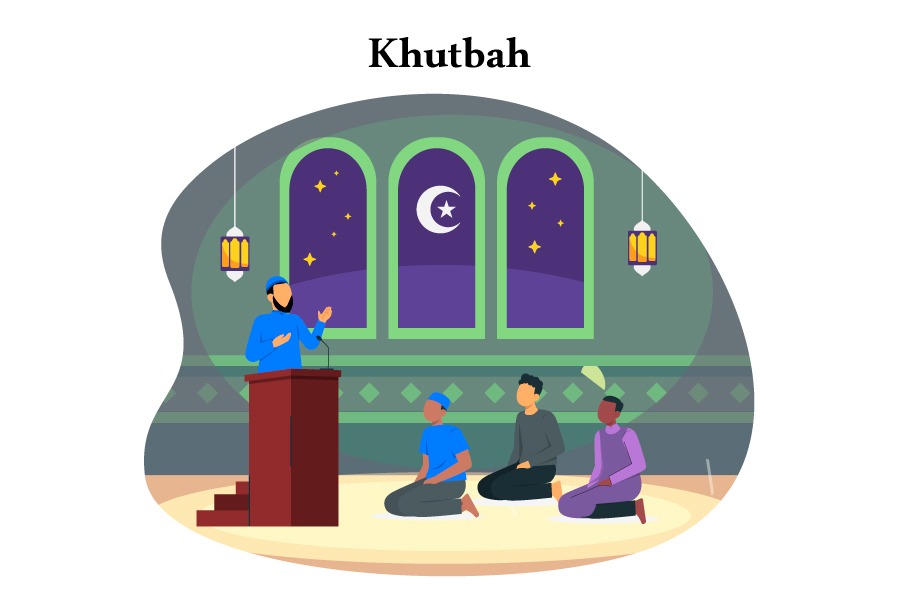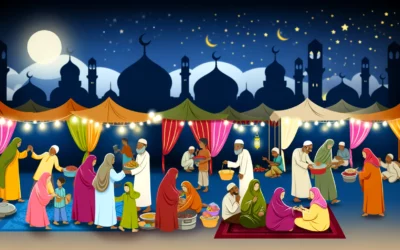In Islam, khutbah refers to the sacred sermon delivered by an imam or a designated speaker during congregational prayers. Khutbah holds significant importance as it serves as a means to educate, guide, and inspire the Muslim community. This article delves into the origins, structure, themes, and impact of khutba in the context of Islamic worship.
What is meaning of khutba?
The term “khutba” refers to the sermon or speech delivered by an imam (religious leader). The khutba is typically delivered in Arabic, the language of the Quran, although translations or summaries may be provided for non-Arabic speaking communities. The imam addresses the congregation, discussing various topics such as Islamic teachings, moral guidance, social issues, and current affairs. The khutba serves as a means of imparting religious knowledge, providing guidance, and fostering unity and spiritual growth among the Muslim community.
Types of Khutbah
Here are the few types of Khutbah in Islam,
-
Jummah Khutba
While the Jummah khutbah is the most well-known and widely observed form of the sermon, there are other types of khutbahs that serve different purposes within the Islamic tradition.
-
Eid Khutbah:
On the days of Eid-ul-Fitr and Eid-ul-Adha, special congregational prayers are held, followed by a sermon known as the Eid khutbah. This sermon typically emphasizes the significance of the occasion, encourages gratitude and celebration, and provides guidance related to the teachings of Islam and the values of the Islamic festivals.
-
Nikah Khutbah:
During the Islamic marriage ceremony, a khutbah is delivered to bless the newlywed couple. The nikah khutbah often highlights the importance of marriage in Islam, emphasizes the rights and responsibilities of spouses, and offers advice on building a strong and harmonious marital relationship.
-
Funeral Khutbah:
At funerals, a khutba is given to honor the deceased and provide consolation and guidance to the mourners. The funeral khutbah usually includes reflections on the transient nature of life, reminders of death and the afterlife, and words of comfort and encouragement to the bereaved.
-
Other Occasional Khutbahs:
Besides the above-mentioned types, khutbahs can also be delivered on various other occasions, such as during Islamic conferences, religious events, or specific community gatherings. These khutbahs address relevant topics, offer guidance, and foster spiritual growth and communal unity.
Historical Significance of Khutba
The practice of khutba can be traced back to the time of the Prophet Muhammad (peace be upon him) and his companions. It originated as a way to address the community, convey important messages, and provide moral and spiritual guidance. The Prophet Muhammad himself delivered khutbahs during Friday congregational prayers, setting a precedent for generations to come.
It holds a significant place in Islamic worship, serving as a source of spiritual guidance, education, and community engagement. Its structure, elements, and themes aim to nurture faith, provide moral and ethical guidance, and address the concerns of the Muslim community. By embracing the essence and responsibilities of the khatib, Muslims can benefit from the khutbah’s transformative impact on their personal, social, and religious lives.
-
Proclamation of the Message:
The Khutba serves as a platform for the proclamation and dissemination of important messages to the Muslim community. It allows the imam (religious leader) to address relevant issues, provide guidance, and impart religious teachings to the congregation.
-
Communal Unity:
Jumu’ah prayer and the accompanying Khutba bring Muslims together in congregational worship. It fosters a sense of unity, solidarity, and brotherhood among the believers, reinforcing the social fabric of the community.
-
Moral and Spiritual Guidance:
The Khutba provides an opportunity for the imam to address ethical and moral issues, reminding the worshippers of their duties towards God and fellow human beings. It offers guidance on various aspects of life, including personal conduct, social responsibilities, and spiritual development.
-
Historical Context:
Throughout history, the Khutba has played a significant role in shaping events and addressing critical situations. It has been used to rally support for just causes, raise awareness about social injustices, and inspire positive change within societies. Many influential historical figures have delivered powerful Khutbas that have had lasting impacts.
-
Preservation of Tradition:
The Khutba is part of the rich Islamic heritage, dating back to the time of Prophet Muhammad (peace be upon him). By maintaining the tradition of delivering the Khutba, Muslims connect with their historical roots and preserve an important aspect of their religious practice.
-
Educational Platform:
The Khutba serves as an educational platform, enabling the imam to teach Islamic principles, share religious knowledge, and provide practical guidance for daily life. It helps in disseminating religious teachings, correcting misconceptions, and nurturing a deeper understanding of Islam among the worshippers.
-
Political Expression:
At certain times in history, the Khutba has been utilized to address political issues and express the collective aspirations of the Muslim community. It has provided a platform for discussing matters of governance, justice, and the well-being of society.
Incorporating Contemporary Issues
The khutbah is not only a means of spiritual guidance but also an opportunity to address contemporary issues faced by the Muslim community. It provides a platform for the khatib to shed light on social, political, economic, and moral challenges, and offer Islamic perspectives and solutions. By incorporating relevant and timely topics, the khutba can contribute to the intellectual and social development of the community.
Benefits of Khutbah
The khutbah, an integral part of Islamic worship, offers numerous benefits to individuals and the Muslim community as a whole. Its significance lies in its ability to provide spiritual upliftment, education, and foster social cohesion. Here are some key benefits of the khutbah:
-
Spiritual Upliftment:
The khutbah serves as a powerful means to connect with Allah and strengthen one’s faith. Through recitation of Quranic verses, prophetic teachings, and reminders of the Hereafter, it rejuvenates the spiritual state of believers, instilling a sense of awe, humility, and devotion.
-
Education and Awareness:
It plays a vital role in educating Muslims about the teachings of Islam. By exploring the Quran, Hadith, and scholarly exegesis, it imparts knowledge on various aspects of faith, morality, and contemporary issues. It promotes intellectual growth, enhances understanding, and fosters a sense of religious literacy among the community.
-
Ethical and Moral Development:
A central focus of the khutbah is to provide ethical and moral guidance based on Islamic principles. It offers practical advice on leading a righteous and virtuous life, emphasizing honesty, justice, kindness, and compassion. By addressing societal challenges, it equips individuals with the tools to navigate ethical dilemmas and make informed choices.
-
Community Engagement:
The khutbah serves as a platform to address communal concerns and foster a sense of unity. It provides an opportunity for the khatib to highlight social issues, encourage positive activism, and promote community involvement. By addressing shared challenges and inspiring collective action, it strengthens social bonds and nurtures a spirit of cooperation among Muslims.
-
Emotional and Psychological Support:
During times of difficulty, the khutbah offers solace, comfort, and encouragement. Whether in times of personal loss or societal hardships, the words of the khatib provide a source of inspiration and hope. By addressing human struggles and offering reassurance through Islamic teachings, it helps individuals navigate life’s challenges with resilience and faith.
-
Personal Reflection and Self-improvement:
It prompts self-reflection and introspection. It encourages individuals to evaluate their actions, seek forgiveness for their shortcomings, and strive for self-improvement. By addressing personal accountability and the pursuit of righteousness, it motivates individuals to continuously work on their character and strive for spiritual growth.
-
Cultural and Linguistic Adaptation:
It has the flexibility to adapt to different cultural contexts and languages. It allows communities to express their unique customs and traditions while adhering to the core principles of Islam. This adaptability fosters inclusivity and enables individuals to connect with the khutbah in a manner that resonates with their cultural background and linguistic preferences.
Conclusion:
The khutbah, as a cherished Islamic tradition, plays a pivotal role in nurturing the faith, education, and communal spirit of Muslims. It serves as a means to connect with Allah, seek guidance from the Qur’an and Sunnah, and address the contemporary issues faced by the Muslim community. By understanding the essence and structure of the khutbah, as well as the responsibilities of the khatib, Muslims can benefit from its spiritual, educational, and social aspects, further strengthening their faith and fostering unity within the community.

















